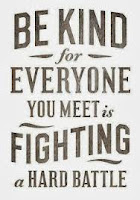 The experiential reality of the nomadic leader is non-conformist. They are wanderers and often seen as a bit
‘outside the camp’. Their experience,
thinking and perceptions typically are unconventional. That is in part because they have eyes open
to things beyond their current context. Not
all these wanderers are lost (thanks for the affirmation J R Tolkien!). Nor are they unstable leaders. For them, clarity and direction often comes while
in a ‘wandering’ state. Neuroscience
affirms this. We often have to stop thinking about the thing we need to
think about in order to let our brains wander. It’s during those times when our brains are
released to make the kinds of connections that eventually lead to creative
thought, clarity and ‘aha’ moments.
The experiential reality of the nomadic leader is non-conformist. They are wanderers and often seen as a bit
‘outside the camp’. Their experience,
thinking and perceptions typically are unconventional. That is in part because they have eyes open
to things beyond their current context. Not
all these wanderers are lost (thanks for the affirmation J R Tolkien!). Nor are they unstable leaders. For them, clarity and direction often comes while
in a ‘wandering’ state. Neuroscience
affirms this. We often have to stop thinking about the thing we need to
think about in order to let our brains wander. It’s during those times when our brains are
released to make the kinds of connections that eventually lead to creative
thought, clarity and ‘aha’ moments.
as a brief introduction to the benefits of 'wandering' for the brain .
I serve as a leader in (and from) an environment where not
only are we outside the camp, but we seek & serve others also who are not part of
the mainstream. Encompass Partnerships
is a collaborative I lead that acknowledges society in general, and
unfortunately often my own Christian community, have frequently ignored the
needs of the 'others' who are not like us. Collectively we have an ingrained tendency to
be ‘campy’, settling into a great life with those who are like us.
Encompass Partnerships' reason for existence is to
collaborate with individuals, agencies and churches who have a commitment to go
to the edge of society where the transforming presence, power and abundance
through Jesus Christ isn’t yet evident. We have a profound belief that no one
is ever to be left out of experiencing the love of God through Jesus. On the ground, it means we act as nomadic,
wandering leaders, agencies and churches.
We wander to the edge. We go
outside the camp. As we do so, our minds
change. New connections are made in both
the brain and the soul. This causes us
to see and feel things differently than those in the camp.
Jesus Christ, who inspires and leads all we do, was
definitely outside the camp:
He was born outside the normal
human process. This also resulted in a
‘outside the camp’ family vis-a-vis cultural expectations. Jesus positioned Himself outside the camp of
the religious system of the day.
Interestingly God Himself had instituted this system. However that system had not only overdeveloped
beyond God’s intentions, but those in it
failed to see what (Whom) it was actually pointing to. There’s a lesson here for our current
institution of the church.
Jesus was crucified outside the
city. Today, His followers are
predominantly outside the camp of mainstream thought, morality & philosophy
worldwide.
Perhaps most profoundly, Jesus’
loves to walk with those who are considered outside the camp of the broader
society. The oppressed, the
marginalized, the socially outcast, the struggling ‘foreigner’.
There’s good reason to be nomadic. Perhaps you need to wander a bit from your
own conventional thinking or well-established theology. Let the Creator of ALL humankind make some
new brain and soul connections.
Get out of where you are.
Go outside the comfy camp of your church or suburb or apartment. Do a
walkabout. See. Smell.
Taste. Touch. Feel.
“Not all who wander are lost”. In fact, by doing so you may just find Him
there, outside the camp.

